This interview originally appeared in Nineteen Questions, and it is shared here by permission.
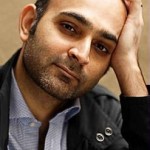 Mohsin Hamid would prefer that you to call him a “nomadic novelist.” Hamid is the author of Moth Smoke, The Reluctant Fundamentalist, and How to Get Filthy Rich in Rising Asia, and each of these novels was written in between continents. Hamid summoned his memories of 1990s Pakistan in Princeton, conjured up a post-9/11 New York in London, and shaded in an unknown metropolis while in Pakistan. His latest book Discontent & Its Civilizations: Dispatches from Lahore, New York, and London, is a collection of essays that touch on Islamophobia, travel, and global politics.
Mohsin Hamid would prefer that you to call him a “nomadic novelist.” Hamid is the author of Moth Smoke, The Reluctant Fundamentalist, and How to Get Filthy Rich in Rising Asia, and each of these novels was written in between continents. Hamid summoned his memories of 1990s Pakistan in Princeton, conjured up a post-9/11 New York in London, and shaded in an unknown metropolis while in Pakistan. His latest book Discontent & Its Civilizations: Dispatches from Lahore, New York, and London, is a collection of essays that touch on Islamophobia, travel, and global politics.
Hamid’s writing is consistently stylish and daring as he breaks down the boundaries between reader and story. Whether it is the dramatic monologue in The Reluctant Fundamentalist, a breakout book that hit the New York Times’ bestseller list, or the second-person narration in Filthy Rich, Hamid’s novels involve the reader in their narratives. We chatted over Skype about his journey as a writer, father, and even his favorite TV shows. (Spoiler alert for Game of Thrones fans!)
How did you start or decide to become a writer?
As a little kid, I was a big reader. I probably started with comic books and children’s stories, and then kept reading throughout my childhood and teens. I’m also quite a fantasist, so I would imagine countries and I loved atlases. I used to imagine little countries where no countries existed, and I was into Dungeons & Dragons as a kid. (Laughs). All of these things, in a way, were a real absorption into storytelling.
When I went to university in the States, Princeton had a wonderful creative writing program with Joyce Carol Oates and Toni Morrison. I remember applying for one of the first creative writing workshops and getting in, and starting to write stories for them. Very quickly I realized that this was what I loved to do. So it was in university for the first time that I thought, I would like to be a professional writer.
You’ve talked about Haruki Murakami’s quote, “Writing a long novel is like survival training. Physical strength is as necessary as artistic sensitivity.” How important was walking during your process?
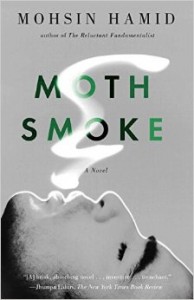 One of the skills that a writer needs to cultivate is: learning how to wait! (Laughs). There are long periods of time where nothing much is going on, and in those moments it’s easy to feel lost. There’s a wonderful quote I read by Amos Oz who thinks of writing as being a shopkeeper: every morning he goes for his walk, and then he opens his shop, sits at his desk, and if a customer comes in, great; customer doesn’t come in, then at least he has opened the shop and done his job for the day. That makes a lot of sense to me as well. You need to find ways in which you are passing the time or remaining open to the writing. In that sense, walking is a part of it for me. I walk for maybe three or four miles, usually an hour or two.
One of the skills that a writer needs to cultivate is: learning how to wait! (Laughs). There are long periods of time where nothing much is going on, and in those moments it’s easy to feel lost. There’s a wonderful quote I read by Amos Oz who thinks of writing as being a shopkeeper: every morning he goes for his walk, and then he opens his shop, sits at his desk, and if a customer comes in, great; customer doesn’t come in, then at least he has opened the shop and done his job for the day. That makes a lot of sense to me as well. You need to find ways in which you are passing the time or remaining open to the writing. In that sense, walking is a part of it for me. I walk for maybe three or four miles, usually an hour or two.
That’s dedication!
Yeah, it is and it isn’t right? You could say, “mindful procrastination.” (Laughs). It’s amazing to me that if I walk an hour, or even half an hour — if I don’t look at my phone once, don’t read an e-book, paper book, or magazine, don’t have a conversation with somebody — how many things start bubbling around in my head. And at a purely physical level, just sitting there hunched over your computer for hours can become painful over the years. Aside from that, the discipline that’s required to write fiction and long-form fiction for years is substantial. So things like exercise, like walking or ritual are very helpful.
You’ve said before that your books often take seven years, but do you have struggles with drafts and crafting an outline?
I probably start off a novel by writing at least part of it that I throw away. I think it is the perfect novel, and I might nail it in one year, but six months or 18 months in, I realize that it is not working at all and I wind up throwing it away. In a sense that opens up the imaginative space for me; it lets me live there for a while. All of these different drafts do have an existence in the final novel, but generally I blunder around a lot.
It’s a bit like getting married. You go out on various dates, have relationships and love affairs, and eventually you find someone you want to commit to. The one you want to commit to is shaped by the other ones, because the person you became in having those other experiences is the person you bring into your marriage.
That’s actually a perfect analogy for it! I’ve been reading the letters of Kurt Vonnegut, who took up board game inventing and playwriting in the middle of his novels. Do you take up other projects and then the novels sometimes fall to the wayside?
Very much so. I don’t really think of fiction writing as a fulltime occupation. In the sense that I can’t do it for very many hours of the day so actually writing-writing — sitting at my desk, typing stuff in, reading what I’ve written — if I can do that for three or four hours that’s a good day for me. For me, my main other job is that I’m a dad, and I’ve got two children. That is a significant commitment, and I think it’s interesting, because many writers who have children struggle to balance the two things. It’s not like I go to some office, and my children are elsewhere. No, they’re around. I’d rather be spending time with them. So that has been something different for me in the last five or six years since I’ve had children.
Writers have the luxury or the financial necessity of having to go out and do something else. Instead of viewing that as a horrible failure, or a terrible burden, I think it’s worthwhile to do that as kind of a lifeline back into the real world. Writing is like a drug: you can get sucked into it and become an addict. I think it can be quite self-destructive so I like the idea of having links to the outside world.
How influential were Camus and other writers in shaping your narrative style like the monologue in The Reluctant Fundamentalist, or the second-person style in How To Get Filthy Rich in Rising Asia?
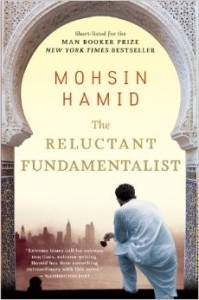 I didn’t grow up knowing many writers of fiction. My knowledge of writing and writers has come from reading them. The writers I admire have shaped me.
I didn’t grow up knowing many writers of fiction. My knowledge of writing and writers has come from reading them. The writers I admire have shaped me.
Whether it’s formally, in particular the modernist tradition of writers like Camus and Calvino and Borges, which I found fascinating; or language, from Hemingway to James Baldwin to Toni Morrison, their approaches to aurality in prose has been very influential.
I’m interested in poetic compression, because poetry has a real economy to it. Then there are writers I look to because they really shaped me politically or my idea of what fiction can do, like Sadat Hassan Manto. Whenever I read a book I love, there’s a very good chance that part of me is thinking, “Wow, I’d like to do something a bit like that.” I feel quite comfortable with that. I don’t think that it’s a negative to be influenced by other writers. It’s entirely natural and, in a way, to be open to influence is quite a healthy state for a writer.
I loved your essay in the New York Times about this current “Golden Age of TV” and its novelistic style. What are some of your favourite TV shows these days?
You know, I’ve been a big fan of Game of Thrones, but the last season — and I’m still a fan — I’m beginning to wonder about its snuff film elements. The idea of making of you attached to characters and seeing them violently killed.
I know! The Oberyn eye gouging was pretty rough.
Yeah, that scene really disturbed me. I know you could say, “Oh well, that’s the purpose of art” but I don’t know. For me, I live in Pakistan and there are horrors in the news every day. I don’t feel that I’m so insulated from such horrors that it’s the purpose of art to remind me. From being a real fan, I have to say that now I have quite mixed emotions about the show. I very much enjoyed Girls. I like it because it feels like it has a strong authorial position. It doesn’t feel like it’s being made by some committee, and it feels quite personal. That said I definitely have things that I don’t like about Girls, but I still follow it with interest. I really enjoy Mad Men. I think it has a real style to it; as a stylist I find it very attractive.
Although I must say, I find it interesting that these three shows I just mentioned, which are among the most popular on American television, are almost entirely white in a way that of course American society isn’t. One of my big frustrations with American television is that it seems desperate to find circumstances that allow it to retain a predominately white cast. Either we will be in some medieval fantasy world where there aren’t any non-white people, or we’ll be set in the 1950s or ‘60s where at this job nobody wants non-whites, or we’ll have a group of friends in Brooklyn who happen to be white. There’s always some reason for it, but in aggregate it winds up being phenomenally exclusionary and very troubling. I think that there is something very deeply conservative about that aspect of American television. Occasionally, you do see shows like The Wire or Treme, but those shows are almost on the periphery of American television.
https://youtu.be/7SQs2Y8drP8
You’ve had two of your books turned into films. How did you feel when someone takes it over? How much involvement did you have over them?
I didn’t think of it as my book being taken away, because I don’t think films are books. I think instead it was a chance to be connected to other people, maybe a couple hundred people, who are going to create their own work of art that would be inspired by something you did.
The film adaptation of Moth Smoke was a television one in Pakistan, and I wasn’t particularly involved. I mainly gave the go-ahead, because I wanted to encourage the evolving and emerging film and television scene in Pakistan. With The Reluctant Fundamentalist, I was a fan of Mira Nair’s work. I loved Salaam Bombay and Monsoon Wedding. As I got to know her, I felt a real personal connection to her. It was kind of an adventure. Many people have come to me and said, “Oh the film is so different from the book.” And it is very different from the book, but that’s okay. Personally, I quite enjoyed the experience of being connected to the film.
With your latest collection of essays, Discontent & Its Civilizations, you’ve got essays that you’d written quite a while ago. How was the self-editing process and looking back at your voice?
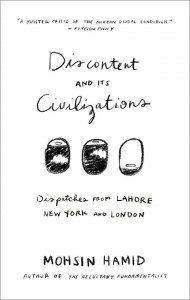 As I went through all these pieces and reread them, I was struck by watching my thoughts evolve over the years. It’s a bit like coming across an old video of yourself as a child or as a teenager. Probably of the hundred plus articles I’ve written, about three dozen were the ones that I chose to keep. That was also an interesting choice of how to keep them and how to structure them.
As I went through all these pieces and reread them, I was struck by watching my thoughts evolve over the years. It’s a bit like coming across an old video of yourself as a child or as a teenager. Probably of the hundred plus articles I’ve written, about three dozen were the ones that I chose to keep. That was also an interesting choice of how to keep them and how to structure them.
I didn’t change the pieces themselves much at all. I mostly limited myself to taking out instances where they were repeating themselves in other pieces. Minor tweaks here and there. The main editing was picking the pieces, the order, and the structure for the pieces. In that sense, you do construct meaning. Once you’ve put previously written essays in a context with a narrative flow, you are shaping them. You’re sort of curating your own work in a way. I really enjoyed it.
I really enjoy your work as a journalist, because the pieces are quite brief but they can pack in a lot of subject matter, like “Islam is Not a Monolith.” How do you maintain that brevity in a journalistic style?
Thanks! I think part of it is my laziness. I write briefly, because I write slowly, but also I read slowly. My wife, who’s not a professional writer, reads much more quickly than I do. It’s interesting to me, because my speaking style is so fast, but I read slowly. I do value brevity. So whenever you use somebody’s time, to me it seems important to think about using only as much time as you need. Therefore I tend to try to compress and shorten and not write more than I have to. My novels usually struggle to reach 200 pages in most cases, and my essays struggle to go past 1000 words, although on occasion I’ll write 3,000 or 4,000-word pieces. Most of the time, I feel I can express myself with less.
On your press tours for the movie and novels, did you ever feel like you had to be the “moderate” mouthpiece voicing the misconceptions about Pakistan or Islam?
I would say that I don’t think of myself as a “moderate” exactly. I think some of my positions are quite extreme, whether it be on migrant rights or gay rights, freedom of expression, minority rights. I’m quite an extremist in arguing for these types of rights. I believe that people should be able to live in any country they want, and it’s a travesty that we think we can deny this from some moral position, just because of the lottery of your birth. I don’t think that’s a moderate position actually, but I’m a moderate in the sense that I believe that attempts to demonize and make un-complex society’s religions are wrong.
I’m quite opposed to violence. I wouldn’t say I’m completely a pacifist in never believing in the use of violence, but I’m extremely sceptical of the use of violence, particularly of violence brought by armies from outside of a country into a country. I think that I try to argue positions that strike me as humane, and I try to expose hypocrisies. For example, that we believe in freedom of expression yet maintain a national security state that criminalizes citizens trying to express what are perceived of as “state secrets,” or that criminalize certain types of hate speech. Perhaps in Pakistan my views, which are completely secular in any religiously-based legislation, might be thought of as quite radical.
How important is humour to your novels? Many people overlook how sardonic Changez can be in The Reluctant Fundamentalist or the unknown narrator in How to Get Filthy Rich in Rising Asia.
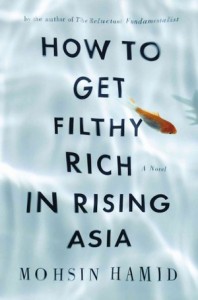 Yes, thank you! Someone said, I think it’s attributed to Einstein but I don’t think he said it, that “creativity is intelligence having fun.” I do have fun, and I try to have fun when I write my books. I hope that readers have fun when they read them. In all of my novels, there are strong currents of humour, which as you say, yes people often completely miss or don’t talk about it.
Yes, thank you! Someone said, I think it’s attributed to Einstein but I don’t think he said it, that “creativity is intelligence having fun.” I do have fun, and I try to have fun when I write my books. I hope that readers have fun when they read them. In all of my novels, there are strong currents of humour, which as you say, yes people often completely miss or don’t talk about it.
How to Get Filthy Rich in Rising Asia isn’t really about its title, or isn’t about it in a straight-faced way, and the subversion of that is a humorous project. Similarly with The Reluctant Fundamentalist, people describe being very frightened by that book and I intended it to be a bit like a mirror. It makes sense that people are frightened by it, but he’s very sardonic. But the whole premise is preposterous! That this person is sitting here talking for three or four hours, we know that doesn’t happen in the real world. It’s real enough that we can allow ourselves to live in the illusion, but hopefully when we return to it we find it kinda funny.
With Moth Smoke, it’s sort of this weird surreal trial where you, the audience, are the white powdered wig-wearing judge and passing on the role of air conditioning in the lives of all the characters. To me, this is funny. I think there is a sense that literature is serious business, and maybe out of a kind of respect, we give literature a weight and gravity. So that makes us less inclined to look for humour in it and to assume that the writer is writing in a non-humorous vein. But I think literature can and should be funny, and there is sometimes nothing but humour to reconcile certain contradictions that just make you want to weep.
You’ve been a bit of an expat while writing some of these novels. Does that distance give you a fresh set of eyes?
Very much so. Whenever I travel I tend to start wondering, what would it be like to live here? I think, “Oh I could stay in this place. I could settle in Rio Di Janeiro. I could live in Sydney.” I don’t know if everybody does this, and in a way I think of myself as less of an expat and more of a nomad. So when I’m wandering and setting up camp someplace, I very briefly think that I’m going to live here. I think that I look everywhere with a nomadic kind of gaze, so I do feel somewhat foreign in Pakistan, even though I’ve lived half my life here, even more than in America and Britain. I think that is actually okay.
To be a writer is to be foreign. Although I’ve found it emotionally difficult or painful or lonely, at other times it makes it easier to connect with people because you recognize that everyone feels foreign. That opens up a space of connection with other people. Writing is a way to do that. If I hadn’t moved between countries I might very well not be a writer today.
* * *
Rumnique Nannar is a graduate student at the UBC journalism program in Vancouver. Her work is published at Empire Magazine, Jugni Style, and Mojo Magazine. Find her on Twitter.












